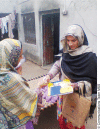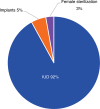Vouchers in Fragile States: Reducing Barriers to Long-Acting Reversible Contraception in Yemen and Pakistan
- PMID: 27540129
- PMCID: PMC4990166
- DOI: 10.9745/GHSP-D-15-00308
Vouchers in Fragile States: Reducing Barriers to Long-Acting Reversible Contraception in Yemen and Pakistan
Abstract
In conflict-affected states, vouchers have reduced barriers to reproductive health services and have enabled health programs to use targeted subsidies to increase uptake of specific health services. Vouchers can also be used to channel funds to public- and private-service providers and improve service quality. The Yamaan Foundation for Health and Social Development in Yemen and the Marie Stopes Society (MSS) in Pakistan-both working with Options Consultancy Services-have developed voucher programs that subsidize voluntary access to long-acting reversible contraceptives (LARCs) and permanent methods (PMs) of family planning in their respective fragile countries. The programs focus on LARCs and PMs because these methods are particularly difficult for poor women to access due to their cost and to provider biases against offering them. Using estimates of expected voluntary uptake of LARCs and PMs for 2014 based on contraceptive prevalence rates, and comparing these with uptake of LARCs and PMs through the voucher programs, we show the substantial increase in service utilization that vouchers can enable by contributing to an expanded method choice. In the governorate of Lahj, Yemen, vouchers for family planning led to an estimated 38% increase in 2014 over the expected use of LARCs and PMs (720 vs. 521 expected). We applied the same approach in 13 districts of Punjab, Khyber Pakhtunkhwa (KPK), and Sindh provinces in Pakistan. Our calculations suggest that vouchers enabled 10 times more women than expected to choose LARCs and PMs in 2014 in those areas of Pakistan (73,639 vs. 6,455 expected). Voucher programs can promote and maintain access to family planning services where existing health systems are hampered. Vouchers are a flexible financing approach that enable expansion of contraceptive choice and the inclusion of the private sector in service delivery to the poor. They can keep financial resources flowing where the public sector is prevented from offering services, and ensure that alternative sources are available for reproductive health services such as family planning. Programs should consider using vouchers in fragile states to facilitate access to family planning services and support the countries' health systems.
© Boddam-Whetham et al.
Figures





Similar articles
-
Increasing Uptake of Long-Acting Reversible Contraceptives in Cambodia Through a Voucher Program: Evidence From a Difference-in-Differences Analysis.Glob Health Sci Pract. 2016 Aug 18;4 Suppl 2(Suppl 2):S109-21. doi: 10.9745/GHSP-D-16-00083. Print 2016 Aug 11. Glob Health Sci Pract. 2016. PMID: 27540118 Free PMC article.
-
Increasing Contraceptive Access for Hard-to-Reach Populations With Vouchers and Social Franchising in Uganda.Glob Health Sci Pract. 2017 Sep 28;5(3):446-455. doi: 10.9745/GHSP-D-17-00065. Print 2017 Sep 27. Glob Health Sci Pract. 2017. PMID: 28963175 Free PMC article.
-
Accessibility and uptake of modern contraceptive methods in Pakistan - a critical view on what works?J Pak Med Assoc. 2021 Nov;71(Suppl 7)(11):S20-S32. J Pak Med Assoc. 2021. PMID: 34793425 Review.
-
Private-Sector Social Franchising to Accelerate Family Planning Access, Choice, and Quality: Results From Marie Stopes International.Glob Health Sci Pract. 2015 Jun 17;3(2):195-208. doi: 10.9745/GHSP-D-15-00056. Glob Health Sci Pract. 2015. PMID: 26085018 Free PMC article.
-
Social franchising and vouchers to promote long-term methods of family planning in rural Pakistan: a qualitative stocktaking with stakeholders.J Pak Med Assoc. 2013 Apr;63(4 Suppl 3):S46-53. J Pak Med Assoc. 2013. PMID: 24386730 Review.
Cited by
-
Cost-Effectiveness of a Family Planning Voucher Program in Rural Pakistan.Front Public Health. 2017 Sep 22;5:227. doi: 10.3389/fpubh.2017.00227. eCollection 2017. Front Public Health. 2017. PMID: 29018789 Free PMC article.
-
Are family planning vouchers effective in increasing use, improving equity and reaching the underserved? An evaluation of a voucher program in Pakistan.BMC Health Serv Res. 2019 Mar 29;19(1):200. doi: 10.1186/s12913-019-4027-z. BMC Health Serv Res. 2019. PMID: 30922318 Free PMC article.
-
Evaluating Quality of Contraceptive Counseling: An Analysis of the Method Information Index.Stud Fam Plann. 2019 Mar;50(1):25-42. doi: 10.1111/sifp.12081. Epub 2019 Jan 21. Stud Fam Plann. 2019. PMID: 30666641 Free PMC article.
-
Sexual and reproductive health services in universal health coverage: a review of recent evidence from low- and middle-income countries.Sex Reprod Health Matters. 2020 Dec;28(2):1779632. doi: 10.1080/26410397.2020.1779632. Sex Reprod Health Matters. 2020. PMID: 32530387 Free PMC article. Review.
-
Effective LARC Providers: Moving Beyond Training (Republication).Glob Health Sci Pract. 2016 Sep 29;4(3):356-8. doi: 10.9745/GHSP-D-16-00258. Print 2016 Sep 28. Glob Health Sci Pract. 2016. PMID: 27688713 Free PMC article.
References
-
- Organisation for Economic Co-operation and Development (OECD). Ensuring fragile states are not left behind, 2013 factsheet on resource flows and trends. Paris: OECD; 2013. Available from: http://www.oecd.org/dac/governance-peace/conflictandfragility/docs/facts...
-
- World Health Organization (WHO) [Internet]. Geneva: WHO; c2016. Family planning/contraception, fact sheet No. 351; updated 2015 May [cited 2016 Jan 21]. Available from: http://www.who.int/mediacentre/factsheets/fs351/en/
-
- Batley R, Mcloughlin C. Engagement with non-state service providers in fragile states: reconciling state-building and service delivery. Dev Policy Rev. 2010;28(2):131–154. 10.1111/j.1467-7679.2010.00478.x - DOI
Publication types
MeSH terms
Substances
LinkOut - more resources
Full Text Sources
Other Literature Sources
Medical
